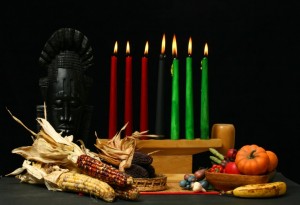
Understanding the traditions of another culture is a great way to gain insight into what is important to its members. Through this knowledge, people can come together in meaningful ways. Consider Christmas, Hanukkah, Saturnalia, and Kwanzaa. One of the underlying elements of each celebration is that of family and friends. Does it really matter why you come together? Recognizing that relationships are essential in human life helps you live with tolerance and compassion. There are a lot of myths about Kwanzaa. Because it’s one of the seasonal celebrations, learn more about this predominantly black holiday that begins on December 26.
Creation of Kwanzaa
In the 1960s, Black Nationalism was a movement of identity that encouraged African-Americans to appreciate their roots. Maulana Karenga, a professor who was completing his doctoral studies at UCLA, first established an organization to bring African-Americans into the political arena in the United States. This came out of the 1965 Watts Riots. Karenga created Kwanzaa in 1966 to give Blacks an alternative to Christmas. He wanted people to celebrate their heritage instead of going along with society.
Seven Symbols of Kwanzaa
The name Kwanzaa is from Swahili. Kawaida, which stands for tradition and reason, includes these seven principles:
- Umoja – unity and peace
- Kujichagulia – self-determination
- Ujima – responsibility
- Ujamaa – economics and cooperation
- Nia – purpose
- Kuumba – creativity
- Imani – Faith
Each day of the seven-day festival of Kwanzaa is dedicated to one of the principles. Although there are many ways to celebrate Kwanzaa, most families decorate with colorful cloth and artwork representing African heritage. Ceremonies can include music, libations, readings of different texts, and discussions of African history. Candles can be lit and artists may perform. As with most holidays from other cultures, no celebration would be complete without a feast. In Swahili, the word is karamu.
Kwanzaa Gains Recognition
Kwanzaa originally was a separate, alternative celebration. In the late 1990s, Karenga changed his stance and considered Kwanzaa an additional celebration, as not to alienate Christians who wished to celebrate the birth of Christ. Kwanzaa did gain popularity, and people around the world now celebrate. The John F. Kennedy Center for the Performing Arts holds an annual celebration as part of its lineup. In 2009, a documentary was released about Kwanzaa. Maya Angelou provided the narration. It helped many people understand the importance of the holiday and brought more attention to it through her popularity.
Kwanzaa has gotten bad press because it was a fairly new holiday created out of a political movement, but it was a needed celebration to bring unity and traditions to a traditionally under-represented race. For many African-Americans, it helped solidify their heritage and ties to their ancestors who helped build the country while establishing their place in today’s society. Kwanzaa was one of the uniting factors in working towards civil rights for everyone, no matter what their race.
Kwanzaa Represents Values and Roots
The number of people who celebrate Kwanzaa in the United States has been calculated at anywhere from one million to thirty million people. Some people even consider the tradition past its prime, because the Black power movement has declined. One study from the University of Minnesota put the figure at around two million who celebrate the holiday in the United States.
Even if you don’t celebrate the holiday, you can learn to say “Habari Gani?”, which is Swahili for “How are you?” Everyone could learn a lot from this holiday, even if it’s just a reminder to take the time with your children to reflect on your heritage and traditions. Kwanzaa is not about presents and parties but about understanding where you came from. How many Americans can say they spend seven days each year remembering their ancestors and culture?

